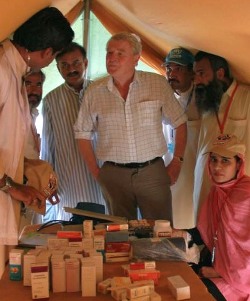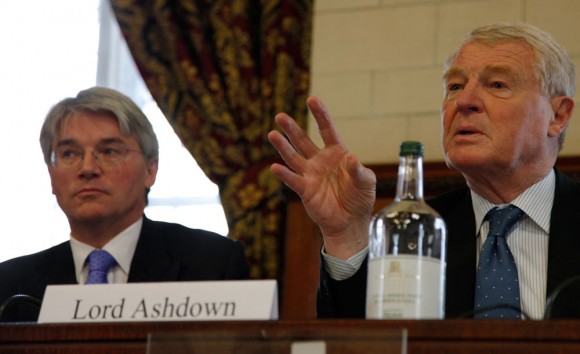When we are confronted by the image of a child trapped in the rubble of an earthquake, or of a family clinging to the roof of a flooded home, we don’t so much commit to help, as feel committed to do so – committed by our shared humanity.
It is because the impulse to relieve suffering is rooted in morality that our interventions to relieve suffering at times of disaster must always be driven by need and need alone.
Nevertheless, the fact that Britain is prepared to play a leading part as a member of the international community in order to relieve suffering at times of crisis makes for a more compassionate and safer world - and that benefits us all.

What is crucial is that when we decide to act, we do so effectively. I take pride in the fact that the British people have shown enormous generosity in their response to the Haiti earthquake and Pakistan floods. But people want to know that every pound they give is a pound spent saving lives and livelihoods.
The scale, frequency and severity of rapid humanitarian disasters will continue to grow in the coming years, and at an accelerating pace. Experts predict that climate related disasters could affect 375 million people every year by 2015, up from 263 million in 2010.
The reasons for this are many. Rapid population growth, especially in disaster prone areas, is a key factor. So too are the changes already underway in sea levels, and in global rainfall and storm patterns – changes that will contribute to significant additional pressure for food and water in the years ahead.
We are caught in a race between the growing size of the humanitarian challenge, and our ability to cope; between humanity and catastrophe. And, at present, this is not a race we are winning. The ability of the international humanitarian community to provide this help is threatened by a number of problems, some new, some familiar.
The first is the global economic crisis, which could make the already slower growing countries of the West less able or willing to provide resources for disaster relief. This gap could be filled by the faster growing ‘emerging’ world economies, but this is far from guaranteed. These countries currently contribute far less to disaster relief, and in any case are likely to remain preoccupied with the relatively high levels of poverty within their own borders.
The second is the rising security threat faced by humanitarian workers on the ground, and the increasing difficulties they face in accessing affected populations. The task of providing humanitarian assistance impartially and on the basis of need is hugely complicated by conflict. The need, on occasion, to work alongside or with hostile groups already presents humanitarian workers with a number of moral and practical problems.
Regrettably, the leadership, management and coordination of the international community’s efforts have not risen even to the challenges we currently face. Unless we radically improve the quality of the leadership of the international effort in humanitarian crises, we will not succeed in dealing with what is ahead.

We've been looking at the way the UK government responds to humanitarian emergencies, and our review has identified much in which the British people can take pride. The Department for International Development, as a policy maker, a funder and a deliverer of aid, has been widely praised for its leading role within the international humanitarian community.
But being good is not going to be good enough given the challenges ahead. We have concluded that merely improving upon what we have done in the past will not be sufficient. We must devise new ways to meet the new challenges.
- First, we need to develop a more anticipatory approach, using science to help us both predict, and prepare for future disasters and conflict.
- Second, we need to build in greater 'resilience' to disasters. This means working closely with local people and institutions to help strengthen their ability to cope.
- Third, we need to improve the strategic, political and operational leadership of the international humanitarian system, from the UN down.
- Fourth, we need to innovate to become more efficient and effective.
- Fifth, we need to increase transparency and accountability towards both donor and host country populations.
- Sixth, we need to create new partnerships to allow DFID to better influence and work within an increasingly complex humanitarian system.
- Finally, as emergencies become bigger and more complex, we need to defend and strengthen the humanitarian space. As well as needing to grant access and protection to humanitarian workers as they seek to provide humanitarian assistance in conflict affected areas we must reassert the core humanitarian principles of humanity, impartiality and neutrality; the promise to assist people on the basis of need, regardless of their gender, religion, ethnicity or political allegiance.
In future, the effectiveness of DFID will depend more on what it can do with others, than on what it can do alone. The UK will need to work more closely with the emerging world powers and with the private sector, as well as with the military. In addition, it will need to nurture its existing partnerships with the EU, the US, other donors, the Red Cross and the international NGOs.
As DFID seeks to meet these challenges, it will need, in everything it does, to become even more innovative, even more of a learning organisation that is always open and welcoming to new ideas. It is our hope that this review will help the UK to maintain that position of international leadership in the face of the challenges that lie ahead.
Please note, this is a guest blog. Views expressed here do not necessarily represent the views of DFID or have the support of the British Government.

Recent Comments